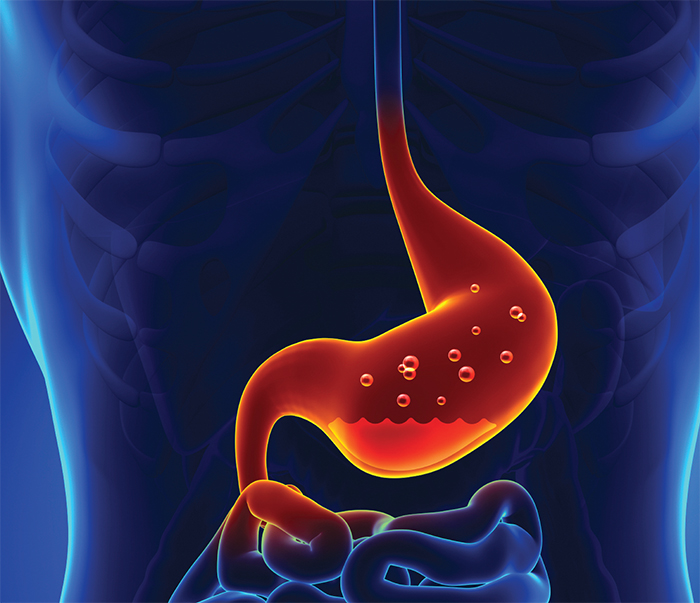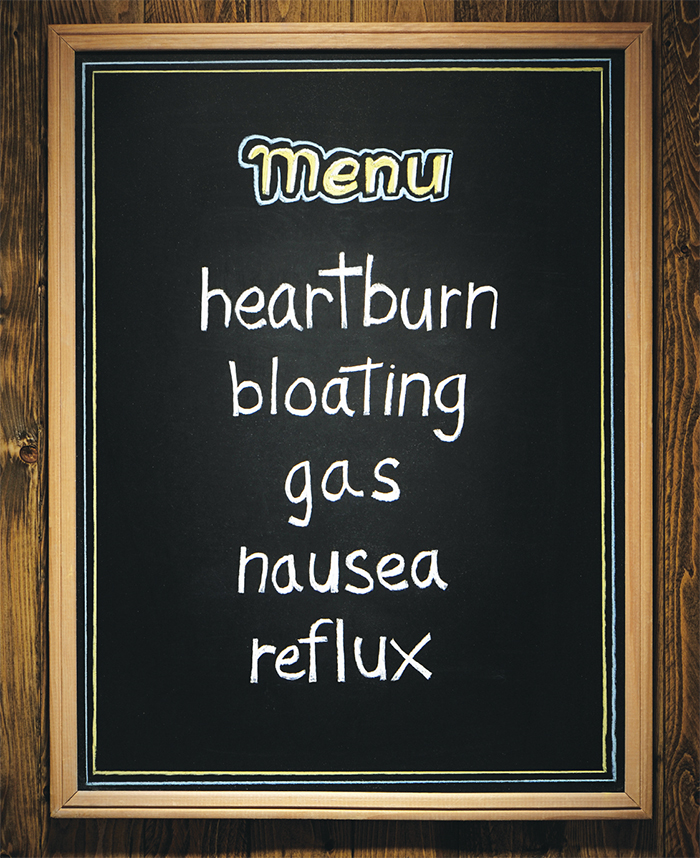In OTC
Bookmark
Record learning outcomes
Most people experience upper GI problems occasionally and, for many, their gut reaction will be to head to their local pharmacy for an OTC medicine and advice on how to stop them happening again.
 
Â
Learning objectives
After reading this feature you should be able to:
- Advise customers on the most effective way to treat upper GI problems
- Explain the causes of indigestion, heartburn and reflux
- Determine when symptoms indicate a more serious condition.
Â
Pharmacy teams are very well placed to advise on over-the-counter medicines and lifestyle advice to help customers resolve or manage mild and infrequent bouts of indigestion, heartburn and reflux themselves. However, it is also important to be able to recognise those upper GI symptoms that may indicate more serious conditions that require referral to a GP.
“Upper GI problems may be considered by many to be a minor complaint, but over time they can lead to conditions like Barrett’s oesophagus and even cancer,†says Nitin Makadia, pharmacist from AAH Pharmaceuticals’ Careway programme.
The biggest added value pharmacy can offer is to help the customer get to the root of the problem, she says. “Treating the symptoms provides a temporary solution, but finding out what has caused them in the first place, what is contributing to them persisting and, importantly, when it is appropriate to visit the GP, supports a customer-centred approach to managing their healthcare in the long-term.â€
The following scenarios outline situations where customers might use the pharmacy as their first port of call and will enable you to test your knowledge of upper GI problems.
An elderly woman is experiencing difficulty swallowing food and medicines
With an ageing population pharmacists are increasingly likely to come across people with swallowing difficulties. Although dysphagia can be caused by certain medical conditions, such as oral and oesophageal cancer or stroke, it is more usually a consequence of the ageing process resulting in the muscles in the throat and mouth becoming weaker and a decrease in saliva production. Some drugs can also cause dysphagia.
Swallowing problems not only affect a person’s ability to eat and take medication but can lead to an increased risk of weight loss, malnutrition, dehydration, impaired quality of life and an associated risk of aspiration, choking or death. The inability or reluctance to take oral medication can also result in a deterioration of any underlying medical conditions.
“Patients may simply require advice on how to swallow medication,†says Michael Stewart, Numark information pharmacist. “This advice can include initially moistening their mouth with saliva or water, placing the tablet in the centre of the tongue lengthways where the tablet is oval and then immediately taking a sip of water to wash the tablet into the throat.
Alternatively, patients can be advised to hold water in the mouth before inserting the tablet. Putting their chin onto their chest when swallowing opens up the oesophagus and facilitates swallowing.
“Where dry mouth is causing swallowing difficulties, symptoms can often be relieved by frequent sips of cool drinks, sucking small pieces of ice or frozen fruit, sucking sugar-free fruit pastilles, chewing sugar-free gum and preventing dry or chapped lips by applying petroleum jelly.
“Where simple measures are ineffective, pharmacists can review any medication that may be exacerbating the problem and advise on an appropriate alternative formulation or routes of administration.â€
 A middle-aged woman suffering from pain in the top of the stomach and vomiting
A middle-aged woman suffering from pain in the top of the stomach and vomiting
This woman’s symptoms, although similar to indigestion, could be due to acute pancreatitis, a serious condition where the pancreas becomes inflamed over a short period of time. Acute pancreatitis, commoner in middle-aged and elderly people, is linked to gallstones in around half of cases and alcohol consumption in about a quarter of all cases.
This woman should be referred to her GP, especially if she complains of severe pain. Treatment for acute pancreatitis focuses on supporting the functions of the body until the inflammation has passed. While most people with acute pancreatitis improve within a week and experience no further problems, severe cases can have serious complications and can even be fatal.
Customers with digestive health problems should be advised that reducing alcohol intake and altering their diet will make gallstones less likely, and will reduce their chances of developing acute pancreatitis.
A young, stressed smoker suffering from repeated heartburn attacks
Heartburn is a symptom of gastro-oesophageal reflux disease (GORD) – a common condition where acid leaks out of the stomach and up into the oesophagus.
The NICE guidance on GORD and dyspepsia in adults1 recommends that community pharmacists offer initial and ongoing help for people with symptoms of heartburn. This includes advice about lifestyle changes and using OTC medication, help with prescribed drugs and advising when a GP should be consulted. Raising the head of the bed and having a main meal well before going to bed may help some people.
A young stressed smoker suffering repeated heartburn attacks should be offered smoking cessation advice and encouraged to find ways of reducing stress levels as both these behaviours can contribute to causing heartburn. Evidence from population-based studies suggests a relationship between ongoing stress, isolated stressful events and gastrointestinal symptoms. Some people report worsening heartburn symptoms with identifiable episodes of stress.2
NICE says pharmacists should give people with heartburn simple lifestyle advice regarding reducing their intake of alcohol, coffee, chocolate, fatty foods and losing weight. Customers should be offered educational materials to support the care they receive. CORE, the charity that funds research into all the diseases of the gut, liver and pancreas, has a patient information leaflet available on heartburn and reflux.3
For most people with heartburn, reflux is just a nuisance and little more than that, says CORE, but for a few people, especially those with severe inflammation of the oesophagus, there is a risk of complications that can include internal bleeding and narrowing of the gullet. In around 4 per cent of patients Barrett’s oesophagus can develop which, in rare cases, can lead to oesophageal cancer.
If the customer’s symptoms do not respond to the lifestyle changes or OTC medication, he/she should be referred to their GP.
A new mum whose baby keeps bringing up milk after feeding
Regurgitation of milk after either breast or formula feeding is a common and generally normal event, says Sara Patience, registered health visitor and author of Easy Weaning.4 Pharmacists need to be able to differentiate between gastro-oesophageal reflux, which is physiologically normal, and GORD (gastro-oesophageal reflux disease), where regurgitation is acidic and causes the infant distress. GORD can lead to complications, such as oesophagitis or pulmonary aspiration.
“It isn’t easy to differentiate between the two conditions, not least because ‘infant distress’ for one parent may be considered normal behaviour by another,†says Sara Patience.
NICE guidelines on GORD in young people and children5 state that at least 40 per cent of babies will experience gastrooesophageal reflux and may regurgitate after most feeds. This typically starts when the baby is around eight weeks of age and resolves over time.
Smaller, more frequent feeds may be beneficial and holding the baby upright after feeds for 10-15 minutes may also help, although this advice is not evidence-based. It should be noted that babies should always sleep on their backs and safe sleeping guidelines followed.
Red flag symptoms include:
- Frequent, forceful, projectile vomiting, particularly in infants under eight weeks of age
- Bile-stained, green/yellow vomit
- Blood in vomit. This can occur if a baby swallows blood from its mother’s cracked nipples.
- New signs, feeding difficulties or faltering growth
- Onset of regurgitation/vomiting after six months or persisting beyond one year
- Problems with stools.
“If a pharmacist is concerned about any physical symptoms, babies should be referred to their GP,†says Sara Patience. “Concerns over feeding difficulties, crying that bothers the parents or babies who require weighing can be referred back to the family’s health visitor.â€
Â
Managing the digestive health category
Nitin Makadia, pharmacist from AAH Pharmaceuticals’ Careway programme, offers the following pointers:
- For indigestion products use point-of-sale messaging to reflect the differences between antacid preparations, which neutralise acid and bring short-term relief to the sufferer, and alginates, which produce a ‘raft’ over the stomach contents to stop them entering the oesophagus to give more lasting relief
- Make the most of opportunities for linked sales. For example, customers can combine a proton pump inhibitor to prevent regular symptoms of indigestion with an antacid to manage any breakthrough symptoms
- The vast range of products in the category can be very confusing for customers, but pharmacy is well-placed to support them to make the correct choice of treatment. WWHAM questions will enable staff to find out how severe and persistent the problem is and provide accurate advice
- Pharmacists have a wider and more effective range of treatments than are available elsewhere, so make customers aware of this by highlighting the availability of ‘pharmacy strength’ medication and tailoring the advice to keep customers coming back
- Digestive health encompasses a broad range of other ailments: diarrhoea, constipation, trapped wind and stomach cramps, for which there are multiple treatments. These need to be very clearly merchandised, with on-shelf messaging to help customers select the most appropriate treatment while inviting them to seek further advice from a member of the pharmacy team.
Michael Stewart, Numark’s information pharmacist:
- Provide self-help cards and leaflets allowing customers to privately review symptoms, products and treatments. This also provides them with the opportunity to read about lifestyle choices and how these can affect their digestive system
- Talk to customers about their symptoms and identify whether they are using the right medicine. If they are making repeat purchases, ask them if they feel the medicines they are using are alleviating their symptoms. Trade people up to more efficacious products, get counter staff to talk to customers about their symptoms, offer advice on product, diet and lifestyle for managing their condition and help them identify triggers
- Offer stop smoking or weight management services in the pharmacy, which will help alleviate symptoms. MURs will identify whether any prescription medicines may be contributing to indigestion
- Get involved with awareness weeks/days run by charities and capitalise on heightened public awareness around these times.
Cathy Crossthwaite, Numark’s marketing co-ordinator:
- It is useful to dual-site fast-acting heartburn relief products in prominent areas of the pharmacy, such as the medicines counter or on clip strips. This will drive impulse purchases for those customers who are in search of quick, effective relief on the go
- When merchandising the upper GI fixture, always lead with indigestion and heartburn lines as these will act as the beacons for the category
- Always display the leading brands to the left of the fixture to help customers find the sub-category they are seeking quickly and efficiently. Customers read a shelf like a book, scanning from left to right.
Â
A pregnant woman struggling with acid reflux, which is worse at night
Many women suffer from acid reflux during pregnancy and by the third trimester nearly three-quarters of pregnant women can be suffering from heartburn.
The symptom is common during pregnancy because the surge in progesterone causes the muscles of the oesophageal sphincter at the entrance to the stomach to relax. This enables stomach acids to travel back up into the oesophagus causing the burning sensation of heartburn. During the latter stages of pregnancy symptoms can also be caused by the growing womb putting pressure on the woman’s digestive tract.
Janet Fyle, professional policy adviser at the Royal College of Midwives, says pharmacists can reassure any pregnant women struggling with acid reflux that, although their symptoms may be painful and uncomfortable, they will not harm the baby. Changes in the diet may be all that is required, she says.
“Pharmacists should advise such women to have breakfast, eat regular small meals, drink plenty of water during the day and avoid eating greasy food or a main meal late at night. Eating dry biscuits and drinking mint tea and milky drinks made with semi-skimmed milk can be helpful. They can also be advised to sleep upright or on their side.â€
OTC antacids and alginates can be taken for indigestion and heartburn in pregnancy as long as the recommended dose is followed. Any iron supplements must be taken two hours before or after the antacid because these preparations can prevent the iron from being absorbed by the body. If the problem persists the woman should be referred to her GP or midwife because the OTC remedies may be masking more serious symptoms, says Janet Fyle.
 Pharmacy can treat the menu of upper GI symptoms
Pharmacy can treat the menu of upper GI symptoms
Â
A patient who takes antihypertensives or NSAIDs and suffers from indigestion
Symptoms of indigestion range from mild discomfort in the upper part of the abdomen to quite severe pain that sometimes goes through into the back. This can be accompanied by a burning discomfort, rising up from the breastbone into the throat if reflux of stomach contents into the oesophagus has occurred. There may also be nausea or vomiting and a feeling of being very full and bloated after meals.
The commonest causes of indigestion include over-eating, rushed meals and a lot of spicy and fatty food.
Some medicines may cause indigestion as a side-effect. NSAIDs are the commonest culprits but antihypertensives can also cause stomach problems because they widen the blood vessels and relax the oesophageal sphincter. Such customers may benefit from a MUR or referral back to the GP who prescribed the antihypertensives.
It is important to be able to recognise those upper GI symptoms that may indicate a more serious condition
Â
Key facts
- The common causes of indigestion are overeating, rushed meals, spicy and fatty food
- The most frequent symptom of reflux is heartburn
- Nearly three-quarters of pregnant women are likely to suffer from heartburn towards the end of their pregnancy
Â
References
- NICE (2014). Gastro-oesophageal reflux disease and dyspepsia in adults: investigation and management.
- Locke GR, Talley NJ, Fett SL, et al. (1999). Risk factors associated with symptoms of gastroesophageal reflux. American Journal of Medicine 106 (6), 642-649.Â
- CORE. Information about heartburn and reflux.
- Sara Patience. Easy Weaning: Everything you need to know about spoon feeding and baby-led weaning. 2014.Â
- NICE (2014). Gastro-oesophageal reflux disease in children and young people: diagnosis and management.

